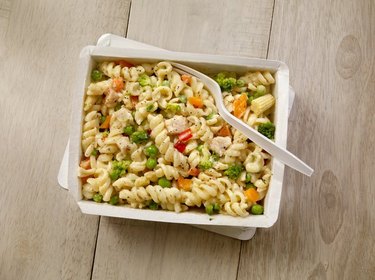
Keeping up with all of the weight-loss programs out there is no easy task. From Weight Watchers to Beachbody to Noom, each one seems to promise impressive results along with the guarantee that it will be the last diet you'll ever need.
The truth? Some of these plans are rooted in science, while some are based on, well, not much at all. So how do you choose the best program — aka one that will actually work for you and isn't a total scam? Here's what you should know.
Ready to Lose Weight?
Set yourself up for success with more from our 30-Day Weight-Loss Kickstart.
What's the Difference Between a Weight-Loss Program and a Diet?
First, let's clarify what we mean when we say weight-loss program, and how these differ from your average diet. The key word here is "program." We're talking about something more comprehensive than just a guideline on what to eat, like the low-carb keto diet or high-protein paleo plan.
Weight-loss programs typically have a company behind them and require some type of subscription or membership. Most of them go beyond telling you what to eat and aim to provide everything you need to lose weight, from counseling to recipes to exercise recommendations.
In short, a weight-loss program should give you much more than a diet. A good program will encourage you to shift to a healthier lifestyle, including daily physical activity, and it may also offer access to nutrition experts who can lend support and answer your questions.
Related Reading
How to Tell if a Weight-Loss Program Is Legit

Before you can narrow down the field of contenders, you first need to identify which programs are trustworthy and effective — and which might do more harm than good. It can be tricky to tell the real deals from the fakes when that stunning before-and-after photo pops up in your Instagram feed or you read a compelling testimonial about someone who finally hit that dream number on the scale. Fortunately, there are several ways to know if a program will really deliver on its promises. The first clue? It should prioritize getting healthy over getting thin.
Here's how to tell if a weight-loss program is bona fide.
The Deal With Weight Watchers

Weight Watchers, which recently rebranded as WW, has been helping people lose weight for more than 50 years and is often named among the best commercial diet plans. The program assigns points to foods based on their nutritional value, and participants are allotted a daily points budget based on their starting weight and how much they want to lose.
While research has found Weight Watchers to be effective and the program is especially lauded for the support system it offers its members, it does have a few features that aren't ideal for some people, including the cost of the more structured plans.
Learn more about the pros and cons of WW.
All About the Mayo Clinic Diet

You may have seen "Mayo Clinic" paired with any number of fad diets, including those that encourage followers to eat just grapefruit or consume only cabbage soup in order to drop pounds. But don't confuse these posers with the real Mayo Clinic Diet, which is grounded in science and backed by the organization's doctors and other experts.
As you might expect from such a reputable source, this program is balanced, takes a slow-and-steady approach to weight loss and helps members maintain when they're done losing. But the program also requires a level of personal responsibility that might deter some people from hopping on board.
Get all the details on the Mayo Clinic Diet, including which foods are included and how the phases work.
What to Know About Jenny Craig

Like Weight Watchers, Jenny Craig has been around for decades, and it often appears on lists of the best commercial diet plans. What sets the program apart from many others, though, is that it provides members with pre-made frozen meals and snacks. Beyond adding a bit of fresh produce, subscribers don't even need to go to the grocery store or cook while following the plan.
While this approach is certainly convenient, it doesn't work for everyone's lifestyle. And because the plan includes a good amount of processed foods, there may be health concerns for some people.
Here's everything you should know about Jenny Craig to help you decide if it's right for you.
Breaking Down the Noom Diet

Although newer on the scene than other tried-and-true plans, Noom is used by nearly 50 million people worldwide. The app-based program aims to educate members on how to make healthier choices (no foods are off-limits) and help them implement small, sustainable lifestyle changes that will result in long-term weight loss and maintenance.
The catch? It's not a quick-fix kind of diet, and plans run on the pricier side. So members must be ready and willing to put in the work (and cash) to see success.
Discover more about the Noom diet — from how it encourages behavioral changes to how much it costs — before you give it a try.